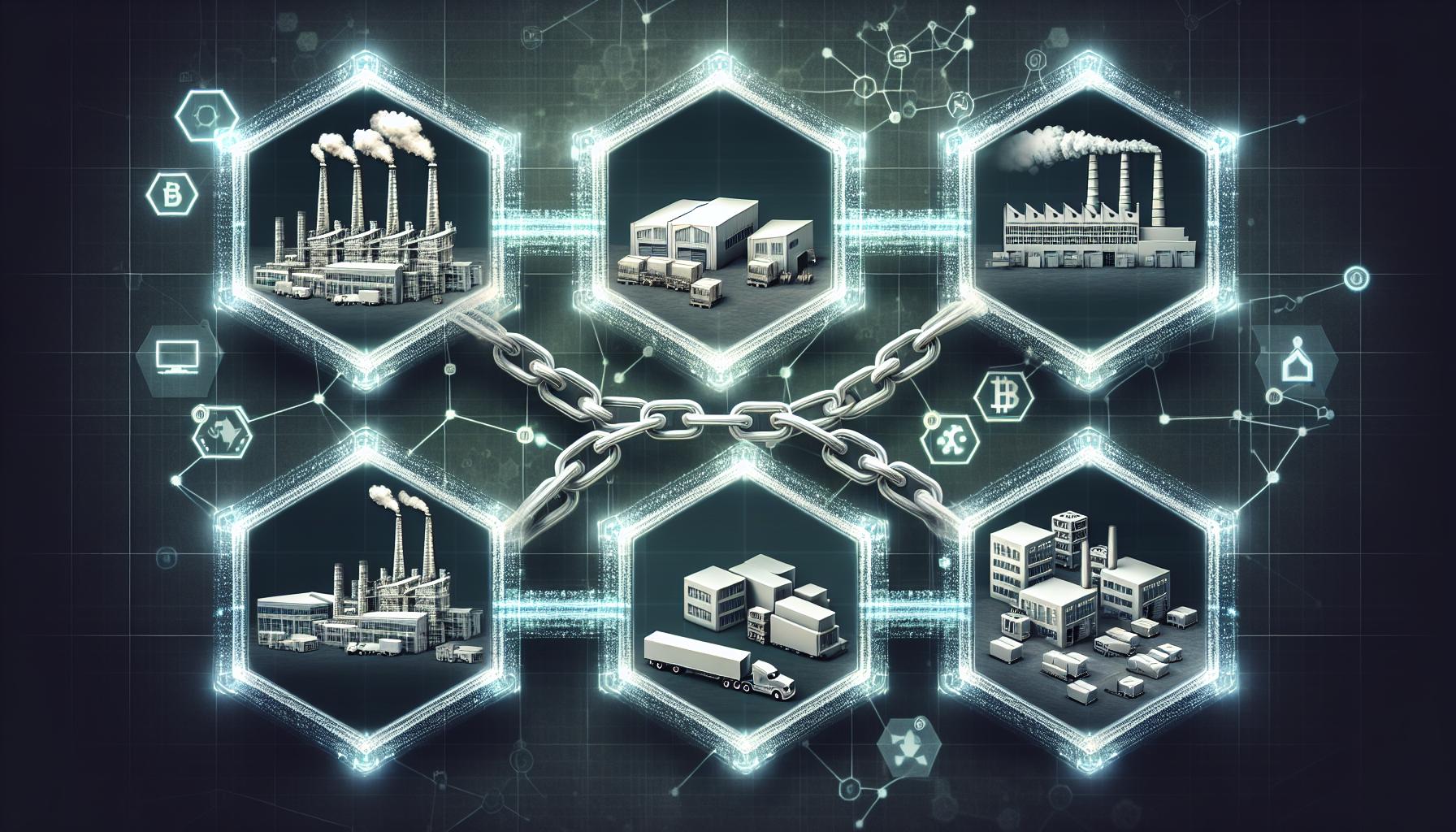Are you curious about how blockchain technology is revolutionizing supply chain management? Imagine a world where transparency, security, and efficiency converge to streamline the movement of goods from manufacturer to consumer. With blockchain’s decentralized ledger system, every step of the supply chain becomes traceable and tamper-proof, ensuring trust among all parties involved.
By leveraging blockchain in supply chain operations, you can eliminate middlemen, reduce paperwork, and enhance the overall speed of transactions. This innovative approach not only optimizes processes but also minimizes errors and fraud, leading to cost savings and improved customer satisfaction. Embracing blockchain technology in supply chains is not just a trend; it’s a strategic move towards a more agile and resilient business ecosystem.
Overview of Blockchain Technology in Supply Chain
Blockchain technology is revolutionizing supply chain management by enhancing transparency, security, and efficiency. Embracing blockchain in the supply chain is crucial for staying competitive in today’s digital landscape. Let’s delve into the immense benefits of leveraging blockchain technology in supply chain operations.
Increased Transparency and Traceability
Blockchain provides a decentralized and immutable ledger that records every transaction across the supply chain network. This transparency helps you track products from their origin to the final destination. By using blockchain for supply chain management, you can ensure authenticity and ethical sourcing of products, which is crucial in the ever-evolving eCommerce industry.
Enhanced Security for Transactions
With blockchain, all transactions are securely recorded and encrypted in blocks, making it extremely difficult for unauthorized parties to alter the data. The cryptographic nature of blockchain technology ensures that your supply chain transactions are protected from fraud and cyber threats. Implementing blockchain in your supply chain operations elevates security standards and builds digital trust among stakeholders.
Streamlined Supply Chain Processes
Integrating blockchain technology in supply chain management simplifies processes by automating tasks through smart contracts. These self-executing contracts trigger actions based on predefined conditions, eliminating the need for intermediaries and reducing the time required for manual paperwork. By utilizing blockchain for supply chain efficiency, you can supercharge transaction speed and optimize workflow management.
Cost Savings and Improved Efficiency
Blockchain minimizes the need for extensive paperwork, middlemen, and manual reconciliation processes in supply chain operations. By reducing overhead costs and eliminating inefficiencies, you can save both time and resources. The decentralized nature of blockchain also eliminates the risk of a single point of failure, ensuring the continuity of operations even in the face of disruptions.
By integrating blockchain technology into your supply chain ecosystem, you unlock a treasure trove of benefits, including enhanced transparency, heightened security, streamlined processes, and significant cost savings. Embrace the power of blockchain to redefine your supply chain efficiency and drive sustainable growth in the eCommerce landscape.
Improving Supply Chain Efficiency with Blockchain

To enhance supply chain efficiency using blockchain technology, you can implement various strategies that leverage the benefits of a distributed ledger system. Blockchain can revolutionize the way supply chains operate by introducing transparency, security, and automation. Here are some key ways to improve supply chain efficiency with blockchain:
Enhancing Transparency in Supply Chains
With blockchain, you can achieve unprecedented levels of transparency in your supply chain processes. Each transaction and movement of goods can be recorded on an immutable ledger, providing real-time visibility into the entire supply chain network. This transparency enables you to track products from their origin to the final destination, ensuring authenticity and ethical sourcing.
Streamlining Supply Chain Processes through Automation
Blockchain technology allows for the automation of supply chain tasks through the use of smart contracts. Smart contracts are self-executing agreements with predefined rules that automatically trigger actions when certain conditions are met. By automating processes such as verification, payment, and fulfillment, you can significantly reduce manual intervention, streamline workflows, and accelerate transaction times.
Increasing Security for Transactions
Blockchain enhances security by providing a decentralized and tamper-proof system for recording transactions. Each transaction is securely encrypted and linked to the previous transaction, creating a chain of blocks that ensures data integrity. By leveraging cryptographic techniques and consensus algorithms, blockchain secures transactions, mitigates the risk of fraud, and protects sensitive information from cyber threats.
Driving Cost Savings and Efficiency
Implementing blockchain in supply chain management can lead to significant cost savings and improved efficiency. By eliminating intermediaries, paperwork, and manual processes, blockchain reduces operational costs, minimizes delays, and enhances overall efficiency. The streamlined workflow management enabled by blockchain technology optimizes resource allocation, reduces administrative overhead, and ultimately drives sustainable growth in the eCommerce industry.
By integrating blockchain technology into your supply chain operations, you can unlock a multitude of benefits, including enhanced transparency, streamlined processes, increased security, and cost savings. Embracing blockchain innovation in the eCommerce sector is essential to staying competitive and meeting the evolving demands of today’s digital marketplace.
Challenges and Limitations of Implementing Blockchain in Supply Chain
When considering the implementation of blockchain in supply chain management, there are several challenges and limitations that one needs to be aware of to ensure a successful integration.
1. Interoperability and Integration Complexities
One of the key hurdles in implementing blockchain in supply chain operations is the interoperability and integration complexities that arise when different systems need to communicate effectively. Integrating blockchain technology with existing supply chain management systems can be a challenging task that requires significant planning and resources.
2. Scalability Constraints
Scalability remains a critical issue when deploying blockchain in supply chain processes, especially in handling a large volume of transactions across a complex network. As the number of transactions increases, blockchain networks may face scalability constraints, impacting efficiency and transaction processing speed.
3. Data Privacy and Security Concerns
Ensuring data privacy and security is another major challenge in implementing blockchain within the supply chain. While blockchain offers enhanced security through its decentralized and immutable nature, concerns around data privacy, access control, and secure sharing of sensitive information persist, requiring robust security measures to be put in place.
4. Regulatory Compliance and Governance
Navigating regulatory compliance requirements and governance frameworks presents a significant challenge in adopting blockchain technology in the supply chain. Different jurisdictions have varying regulations concerning data management, smart contracts, and digital transactions, necessitating careful consideration and adherence to legal standards.
5. Costs and Financial Implications
Implementing blockchain solutions in supply chain management involves initial setup costs, ongoing maintenance expenses, and potential financial implications related to network participation and transaction fees. Organizations need to evaluate the cost-effectiveness of blockchain integration and consider the long-term financial impact on their operations.
6. Skill and Knowledge Gaps
Addressing skill and knowledge gaps among stakeholders and supply chain professionals is crucial for the successful implementation of blockchain technology. Training staff, updating skill sets, and fostering blockchain expertise are essential to leverage the full potential of blockchain in optimizing supply chain processes.
By acknowledging and addressing these challenges and limitations proactively, you can better prepare for the integration of blockchain technology into your supply chain operations, ensuring a smoother transition and reaping the benefits of enhanced transparency, security, and efficiency in your supply chain management practices.
Future Outlook for Blockchain in Supply Chain Management
Incorporating Blockchain Supply Chain Efficiency can bring significant transformation to the way businesses manage their supply chains. As companies continually strive for enhanced Retail Transparency and streamlined processes, blockchain technology presents promising solutions. Looking ahead, the future outlook for blockchain in Supply Chain Management is optimistic, with several key trends shaping the landscape:
- Enhanced Data Security: Blockchain’s immutable and secure nature will continue to address concerns regarding data integrity and confidentiality. By leveraging Blockchain Distributed Ledger eCommerce, companies can ensure that critical supply chain information remains tamper-proof and transparent.
- Integration of Smart Contracts: The utilization of Smart Contracts for Retail within blockchain networks will automate transactions and enforce agreements efficiently. This innovation streamlines operations and minimizes the need for intermediaries, ultimately enhancing Supply Chain Efficiency.
- Drive Towards Decentralization: The rise of Decentralized Marketplaces Blockchain signifies a shift towards more transparent and inclusive supply chains. Decentralized eCommerce platforms powered by blockchain are set to revolutionize traditional retail models, fostering a more collaborative ecosystem.
- Cryptocurrency Adoption: As Cryptocurrency eCommerce Adoption gains momentum, integrating digital currencies into payment systems will become mainstream. Companies can leverage Blockchain Technology to facilitate secure and seamless transactions, catering to the evolving demands of tech-savvy consumers.
- Focus on Sustainability: Blockchain’s ability to track and trace products from their source to the end-user enables greater Retail Blockchain Transparency. This transparency serves as a catalyst for environmentally conscious practices, promoting sustainable supply chain management.
- Innovative Supply Chain Solutions: The integration of Blockchain Retail Innovations will unlock new opportunities for operational efficiencies and cost savings. Companies that embrace blockchain technologies stand to benefit from increased accuracy, reduced fraud, and improved traceability.
By embracing these emerging trends and technologies, businesses can stay ahead of the curve in an increasingly digital and interconnected Supply Chain Management landscape. Blockchain offers a promising path towards achieving greater operational efficiency, enhanced Retail Security, and improved Supply Chain Transparency.
Conclusion
You’ve now explored the transformative impact of blockchain technology on supply chain efficiency. By leveraging transparency, security, and automation, blockchain offers a robust solution for streamlining operations. Despite challenges, embracing trends like enhanced data security and smart contract integration can pave the way for improved supply chain management. As businesses adapt to these innovations, they stand to benefit from increased operational efficiency and enhanced transparency. The future of supply chain management lies in the adoption of blockchain technologies, promising a more secure, decentralized, and sustainable ecosystem. Embrace these advancements to stay ahead in the ever-evolving digital landscape.
Frequently Asked Questions
What is blockchain technology’s role in supply chain management?
Blockchain technology enhances supply chain efficiency through transparency, security, and automation. Its distributed ledger system ensures trust and traceability, revolutionizing traditional supply chain processes.
How does blockchain enable goods tracking in the supply chain?
By recording transactions in a secure and transparent manner, blockchain enables real-time monitoring of goods throughout the supply chain. Each entry is immutable and timestamped, providing a comprehensive record of a product’s journey.
What are smart contracts and how do they automate processes in the supply chain?
Smart contracts are self-executing contracts with pre-defined terms stored on the blockchain. They automate various supply chain processes like payment verification, order fulfillment, and compliance, streamlining operations.
What challenges come with implementing blockchain in supply chain management?
Challenges include integration complexities with existing systems, regulatory hurdles, scalability issues, and data privacy concerns. Overcoming these challenges requires collaborative efforts and innovative solutions.
What are the future trends for blockchain in supply chain management?
Future trends include enhanced data security, increased smart contract integration, decentralization of networks, cryptocurrency adoption for payments, sustainability-focused practices, and the development of innovative supply chain solutions. Embracing these trends can drive operational efficiency and transparency.

